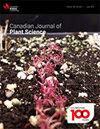脱水素样蛋白与葡萄抗寒性的相关性
IF 1
4区 农林科学
Q3 AGRONOMY
引用次数: 0
摘要
在气候凉爽的葡萄栽培区,由于抗寒性不足,葡萄的冬季生存可能受到威胁。脱水素是一种常见于植物组织中的蛋白质家族,用于应对脱水应激和寒冷暴露。为了确定它们在越冬葡萄藤中的存在及其与抗寒性的关系,在2016-2017年冬季,每两到三周从一个商业葡萄园取样一次葡萄品种长相思的复芽。通过SDS-PAGE提取和分离蛋白质,并用针对脱水素K段共有序列产生的商业抗体对潜在的脱水素进行免疫印迹。在四个长相思克隆中鉴定出6条23、26、35、41、48和90kDa的蛋白质带,由于它们与K段抗体的反应,显示出与脱水素的血清学关系。在胰蛋白酶消化和用Mascot分析的LC-MS/MS之后,在23、41、48和90kDa处的条带被确认为脱水蛋白。它们在整个休眠季节的波动通过免疫印迹进行量化,出现了三种模式:23、26和35kDa蛋白在去气候前立即达到峰值;41kDa和48kDa蛋白在最大抗寒性期间达到峰值,并在去气候的过程中降低,而90kDa在同一时期趋于稳定。除23kDa蛋白外,所有蛋白的最大抗寒性和相对脱水蛋白带强度均呈正相关(p<0.050)。积累模式的变化以及与抗寒性的关系表明,这些脱水蛋白可能受到不同分子过程的调节,并可能在整个休眠期的低温保护中发挥不同的作用。本文章由计算机程序翻译,如有差异,请以英文原文为准。
Correlation between dehydrin-like proteins and cold hardiness of grapevine
Winter survival of Vitis vinifera Linnaeus in cool climate viticultural areas can be jeopardized due to inadequate cold hardiness. Dehydrins are a family of proteins commonly found in plant tissue in response to dehydration stress and cold exposure. To determine their presence and relationship to cold hardiness in overwintering grapevines, compound buds of V. vinifera cv. Sauvignon blanc were sampled from a commercial vineyard every two to three weeks throughout the 2016-2017 winter. Proteins were extracted and separated by SDS-PAGE, and potential dehydrins were immunoblotted with a commercial antibody raised against the dehydrin K-segment consensus sequence. Six protein bands were identified in four Sauvignon blanc clones at 23, 26, 35, 41, 48 and 90 kDa, showing a serological relation to dehydrins due to their reaction with the K-segment antibody. The bands at 23, 41, 48, and 90 kDa were confirmed as dehydrins following trypsin digestion and LC-MS/MS with Mascot analysis. Their fluctuations throughout the dormant season were quantified by immunoblotting and three patterns emerged: the 23, 26 and 35 kDa proteins peaked immediately prior to deacclimation; the 41 and 48 kDa proteins peaked during maximum hardiness and decreased towards deacclimation while the 90 kDa plateaued during the same period. Maximum hardiness and relative dehydrin band intensity were positively correlated (p < 0.050) for all but the 23 kDa protein. The variation in accumulation patterns and relationships to cold hardiness indicates that these dehydrin proteins are likely regulated by different molecular processes and could play different roles in cryo-protection throughout dormancy.
求助全文
通过发布文献求助,成功后即可免费获取论文全文。
去求助
来源期刊
CiteScore
1.90
自引率
8.30%
发文量
91
审稿时长
1 months
期刊介绍:
Published since 1957, the Canadian Journal of Plant Science is a bimonthly journal that contains new research on all aspects of plant science relevant to continental climate agriculture, including plant production and management (grain, forage, industrial, and alternative crops), horticulture (fruit, vegetable, ornamental, greenhouse, and alternative crops), and pest management (entomology, plant pathology, and weed science). Cross-disciplinary research in the application of technology, plant breeding, genetics, physiology, biotechnology, microbiology, soil management, economics, meteorology, post-harvest biology, and plant production systems is also published. Research that makes a significant contribution to the advancement of knowledge of crop, horticulture, and weed sciences (e.g., drought or stress resistance), but not directly applicable to the environmental regions of Canadian agriculture, may also be considered. The Journal also publishes reviews, letters to the editor, the abstracts of technical papers presented at the meetings of the sponsoring societies, and occasionally conference proceedings.

 求助内容:
求助内容: 应助结果提醒方式:
应助结果提醒方式:


